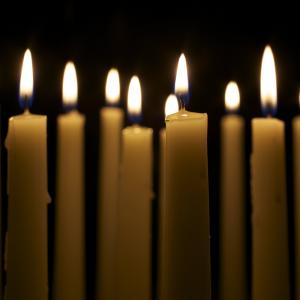
Joan Chittister, OSB, a Sojourners contributing editor, is executive director of Benetvision and the author of many books, including The Monastery of the Heart (Bluebridge, 2011). For more, visit monasteriesoftheheart.org.
Posts By This Author
From the Archives: June 1987
That's Contemplation
THE OLDEST mystics that we have in organized religious expression ... all have similar parabolic insights into contemplation. There is a story about the master saying to the disciples, “Tell me how you know when it is dawn.” And one disciple says, “Master, is it when we can tell the fig tree from the lemon tree at 100 paces?” And the master says to the disciple, “No, that is not how you will know it is dawn.”
So a second disciple says, “Well then, master, is it when you can tell the sheep from the goats at 50 paces?” And the master says, “No, that is not how we shall know when it is dawn.” Then the third disciple says, “Well then, master, how do we know that we have seen the dawn?” And the master says, “We will know that we have seen the dawn when we can see the face of Christ in the face of any brother or sister, no matter how near or how far.”
That’s contemplation. That’s the fruit of the contemplative life.
And unless you’re putting on the mind of Christ, I don’t know if you’ll ever see the face of the Christ in the other, or the face of the cosmic, or the face of the people of God in the other. You may be a highly efficient social worker or a marvelously compassionate do-gooder, but you will not necessarily be a Christian contemplative.
This is an excerpt of an article that originally appeared in the June 1987 issue of Sojourners. Read the full article here.
Reconciling Tradition and Change
An excerpt from Radical Spirit: 12 Ways to Live a Free and Authentic Life, by Joan Chittister, OSB
An excerpt from Radical Spirit: 12 Ways to Live a Free and Authentic Life, by Joan Chittister, OSB
Grief, Courage, and Perseverance
Nine reflections on stopping gun violence, a year after the massacre in Newtown

swatchandsoda / Shutterstock
[Editor's note: This article first appeared in our December 2013 issue to commemorate the one year anniversary of the Sandy Hook shooting.]
IN THE YEAR since the mass shooting at Sandy Hook Elementary School in Newtown, Conn., last Dec. 14, thousands more have died by gun violence, and the NRA seems to stymie sane firearm measures at every turn. How do we stave off despair, hold on to hope, and keep moving forward when the odds feel overwhelming? —The Editors
Bigger Than Politics
What do we say to those who are weary?
by Brian Doyle
WHAT WOULD I SAY to those who are weary of assault rifles mowing down children of all ages, every few months, for as long as we can remember now? Oregon Colorado Wisconsin Pennsylvania Connecticut Texas Massachusetts Minnesota Virginia do I need to go on? I would say that this is bigger than politics. I would say this is about money. I would say Isn’t it interesting that we are the biggest weapons exporter on the planet? I would say that we lie when we say children are the most important things in our society. I would say that the next time a tall oily smarmy confident beautifully suited beautifully coiffed glowing candidate for office says the words family values, someone tosses an assault rifle on the stage with a small note attached to it that reads Is this more important than a kindergarten kid?
We all are Dawn and Mary in our hearts and why we wait until hell and horror are in front of us to unleash our glorious wild defiant courage is a mystery to me.
I would also say, quietly, that this is bigger than rage and anger and snarling at idiots who pretend to hide behind the Constitution. I would say this is also about poor twisted lonely lost bent young men no one paid attention to, no one really cared about. And I would say that people like Dawn Hochsprung and Mary Scherlach, who ran right at the bent twisted kid with the rifle in Newtown, are the flash of hope and genius here. Those are the people I will celebrate on Dec. 14. There are a lot of people like Dawn Hochsprung and Mary Scherlach, may they rest in peace. We all are Dawn and Mary in our hearts and why we wait until hell and horror are in front of us to unleash our glorious wild defiant courage is a mystery to me. But it’s there. And there are a lot of days when I think the whole essence of Christianity, the actual real no kidding reason the skinny Jewish man sparked the most stunning possible revolution in history, is to gently insistently relentlessly edge us away from our savagely violent past into a future where Dawn and Mary are who we are, and you visit guns in museums, and war is a joke, and defiant peace is what we say to each other all blessed day long.
Brian Doyle is the editor of Portland Magazine at the University of Portland (Oregon) and the author most recently of The Thorny Grace of It, a collection of spiritual essays.
-----
An Insanity of Rationality
This spiritual disease thrives on violence and calls it good.
by Joan Chittister, OSB
THERE IS A MADNESS abroad in the land, hiding behind the Constitution, brazenly ignoring the suffering of many who, over the years, have died in its defense, and operating under the banner of rationality. It’s a rare form of spiritual disease that thrives on violence and calls it good.
They want a proper response to violence, they tell us, and, most interesting of all, they insist that only violence can control violence. If “the good guys” have guns, this argument goes, “the bad guys” won’t be able to do any harm.
The hope? The hope lies only in those who refuse to feed this addiction to violence.
This particular insanity of rationality argues that violence is an antidote to violence. Then why do we find scant proof of that anywhere? Why, for instance, hasn’t it worked in Syria, we might ask. And where was the good of it in Iraq, the land of our own misadventures, where the weapons of mass destruction we went to disarm did not even exist and the people who died in the crossfire of that insanity had not harbored bin Laden. So how much peace through violencehave all the good guys on all sides really achieved?
The insanity of rationality says it is only reasonable to arm a population to defend itself against itself. And so, day after day, the level of violence rises around us as hunting rifles and small pistols turn into larger and larger weapons of our private little wars.
Clearly this particular piece of childish logic has yet to quell the gang violence in Chicago. It didn’t even work on an army base in Texas where, we must assume, the place was loaded with legal weapons.
What’s more, it does nothing to save the lives of the good guy’s children, who pick up the good guy’s guns at the age of 2 and 3 and 4 years old and turn them on the good guy fathers who own them.
So the mayhem only increases while white men in business suits insist that their civil rights have been impugned, their right to defend themselves has been taken from them, and more guns, larger guns, insanely damaging guns are the answer. Instead of hiring more police officers, they argue that arming students and teachers themselves, nonprofessionals, will do more to maintain calm and control the damage in situations specifically designed to cause chaos than waiting for security personnel would do.
It is that kind of creeping irrationality that threatens us all.
And in the end, it is a sad commentary on our society. We have now become the most violent country in the world while our industries collapse, our educational system declines, women are denied healthcare, our infrastructure is falling apart, and there’s more money to be made selling drugs in this country than in teaching school. No wonder gun pushers fear for their lives and sell the drug that promises the security it cannot possibly give while the country is becoming more desperate for peace and security by the day.
The hope? The hope lies only in those who refuse to feed this addiction to violence. These are they who remember again that we follow the one who said “Peter, put away your sword” when it was his own life that was at stake.
The hope is you and me. Or not.
Joan Chittister, OSB, a Sojourners contributing editor, is executive director of Benetvision, author of 47 books, and co-chair of the Global Peace Initiative of Women.
A 'Hostile Takeover' of Women Religious
The Vatican attacks on Catholic sisters will sap the church's impact in the world.
AFTER THE VATICAN’S “hostile takeover” of the Leadership Conference of Women Religious in April, I was particularly struck by one joke I encountered: “Go Catholic ... and leave the thinking to us.”
I laughed—but not much. That one, it seems, is too close to the truth these days.
The Leadership Conference of Women Religious (LCWR), a major educational center for superiors of Catholic women’s religious orders in the U.S., was launched in 1956 at the urging of the Vatican. For years, it has been a venue where officers of every congregation of women religious are invited to meet, study, and consider together the role and place of women religious in the resolution of the issues of the time. Now the LCWR has been put under the control of three bishops: Peter Sartain of Seattle; Leonard Blair of Toledo, Ohio; and Thomas John Paprocki of Springfield, Illinois.
The officers and body of the LCWR—all superiors, prioresses, or other officials of major, longstanding institutions—are no longer authorized to plan its programs, engage its speakers, or create and implement its structures. Instead, Sartain, Blair, and Paprocki have been appointed to oversee the group: to approve its programs, create its constitutions, determine its operational procedures, and define the content of its conferences. As in, “Leave the thinking to us.”
As in, women can’t do it themselves. Or, women aren’t moral agents. Or, women don’t know what they’re doing. Or, the girls need to be controlled. Or, father knows best.
Monasteries of the Heart
A vibrant spirituality for our troubled times grows out of a centuries-old tradition.
What Sustains Me: Lectio
The Gift of Struggle
Struggle is a universal part of human experience, but hope—though hard to see in disappointing circumstances—is the other side of that coin.
Seeing With One Eye
The real cost of exclusion
A recent editorial cartoon showed a clerical procession in which a mitred man is being preceded down a church aisle by two young altar boys. The cardinal is carrying a placard that reads, "Celibacy has nothing to do with pedophilia. " The scowling little altar boy who is leading the procession, however, is saying to his partner, "Oh, yeah? Well, if he were a father, I bet he wouldn't let anything happen to kids."
The message is clear: There are some things that may be clinically unrelated to the problem at hand but that definitely have a bearing on it. Surely, the role of women in the church is one of those. If the scandal points up anything at all, it begs for a review of the role of women in the decision-making arenas of the church, and the question of the ordination of women as well.
What the scandal highlights in the most glaring of ways is the total absence of women from the inner chambers of ecclesiastical discussion and procedural review. Would women have stood by quietly, said nothing, even agreed to a policy of moving clearly abusive men from parish to parish where they could jeopardize the lives of other children so that the system itself could be saved? The answer is unclear, perhaps, but the question is a necessary one.
Whether or not women as a class would have agreed to such policies is impossible to determine. We may, however, have some clues to the answer, even without benefit of the experience. Women are not more virtuous than men—they have sins of their own—but they do judge systems a great deal more lightly than men do. Women tend to be caretakers and advocates. They are, if we are to believe most of the social-science research in the area, given more to a desire to create and maintain personal relationships than they are to a desire to get and keep power. To have women at the table for discussions could, then, introduce a balance of values, another set of priorities, a broader agenda.
The Faith Will Survive
The institutional church, on the other hand, is in serious trouble.
The question everywhere is the same these days: What, in the long run, will be the effect of the pedophilia scandal on the Catholic Church? Speculation ranges from predictions of total collapse to speculation about total reconfiguration. Given the long lessons of history, neither hypothesis is likely, perhaps, but we may have already been given a mirror into the future of change. Let me tell you what I've seen already.
It was 1996. I was in Dublin at the time writing a book. To do concentrated work I had gone away to live alone in a small townhouse on the canal. For a while, there were no distractions at all. But then the first pedophilia scandal erupted in Ireland. I found myself as immersed in the story as the rest of the country but, as an outside observer, more concerned about the overall effects of the situation than by the cast of characters. I began to understand that the Irish, too, were dealing with this situation differently than they had in the past.
The Irish had already dealt with the case of a bishop who had fathered a son years before, supported him financially all his life, but never acknowledged him. They had read themselves weary about the young pastor who dropped dead leaving a mistress housekeeper and their children who were now suing the diocese for his estate. They had watched the church battle the government over the legalization of contraception. The Irish, it seemed, were well battle-tested on sexual scandals.
A Dangerous Discipleship
"Whenever people discover that they have rights, they have the responsibility to claim them."
—John XXIII, "Pacem in Terris"
A Time for Hard Decisions
War was so much easier before the world's borders began to seep like a sieve.
Seeing My Better Self
A Light in the Tempest
Peace is no longer a safe theological subject or an interesting intellectual debate.
The Balance of Time: Spirituality to Sustain a Life of Ministry
An Interview with Joan Chittister
A Sign and a Choice: The Spirituality of Community
An Interview with Joan Chittister





